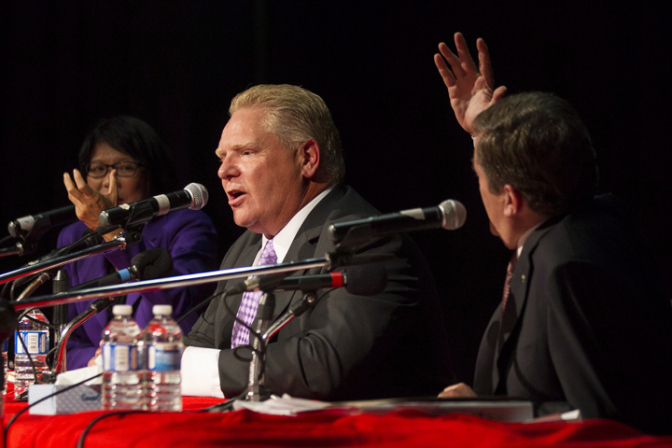TORONTO – A Twitter chat about sexism in politics is drawing attention to not only reports of gender inequality, but also racism and homophobia in Toronto’s municipal election.

The #ElxnSexism chat hosted Tuesday night by non-partisan group Women in Toronto Politics offered the chance for individuals to share their experiences of sexism during election campaigns. The chat also drew attention to examples of racism and homophobia that some candidates face.
http://twitter.com/laurendorphin/status/517093846329868289
In Toronto’s election campaign, mayoral candidate Olivia Chow has frequently highlighted sexist remarks she’s encountered on the campaign trail. Following a debate in July, former Ontario Progressive Conservative MPP Peter Shurman called Chow a “major-league biatch.”
On Newstalk’s 1010 show Moore in the Morning, Shurman said:
Chow’s camp said Shurman’s comments point to a double standard in politics, where men who are aggressive are called tough, while women are called names.
Chow participated in Tuesday’s #ElxnSexism Twitter chat, also drawing attention to racism and homophobia in politics.
During a mayoral debate in September between Chow, John Tory and Doug Ford, a heckler in the crowd yelled at Chow to “go back to China.”
Last month Coun. Kristyn Wong-Tam tweeted out a photo of a letter she received at City Hall. The letter contained threatening and hateful language toward the openly gay councillor.
Wong-Tam told media that it wasn’t the first time she had received “hate mail” but added that she shared the letter as an attempt to “name it and try and change it.”
Of course, examples of sexism in politics aren’t confined to the Toronto election. Last month in the lead-up to the New Brunswick provincial election, female candidates reported being targeted because of their gender.

Get breaking National news
Tammy Rampersaud, the Liberal candidate for New Brunswick’s Riverview riding, reported receiving derogatory notes throughout her campaign and being approached while canvassing.
“A gentleman had approached me in a black SUV and was threatening in this instance,” said Rampersaud. “He had told me if I wasn’t careful I was going to get hurt and that I was playing a game with the big boys.”
Stephanie Tomilson, who was running in the province’s Rothesay riding, said a number of her election signs were vandalized and had to be removed immediately — the words were “quite sexist and derogatory,” she said.
WATCH: Female candidates targeted by vandals
Beth Lyons, the associate director of the Moncton YWCA, said the incidents are a reminder of the under-representation of women in politics.
“It’s a culture of politics we need to change,” said Lyons. “Structures and institutions we need to change and misogyny we need to change.”
In the run-up to last year’s municipal election in Edmonton, there stood a real possibility of voters electing an all-male council, something former cabinet minister and Edmonton MP, Anne McLellan, called simply unacceptable.
“It’s pretty remarkable in a major urban centre in 2013 to see an all-male council,” McLellan told Global News. “It’s certainly not representative of the population.”
In the end, Don Iveson beat out Karen Leibovici and Kerry Diotte in the mayor’s race, and one female councillor — Bev Esslinger in Ward 2 — was elected.
While the situation could be characterized as an “an unfortunate convergence of circumstances,” with three senior female councillors retiring, and a fourth – Leibovici – running for mayor, McLellan said a national movement is needed to encourage more women to run for elected positions.
WATCH: Cristina Martins on women in politics
According to the Federation of Canadian Municipalities (FCM), women represent 24 per cent of elected officials at the municipal level in Canada (16 per cent of mayors are women and 26 per cent of councillors). The FCM is working to close the gender gap in Canadian municipalities with programs aimed at increasing the representation of women in municipal politics to 30 per cent (which the United Nations defines as the minimum level required in order for a government to reflect the concerns of women).
In the 2010 election, Toronto surpassed the 30 per cent mark, with 15 women being elected to the 44-seat council.
With files from Global News’ Brion Robinson


Comments